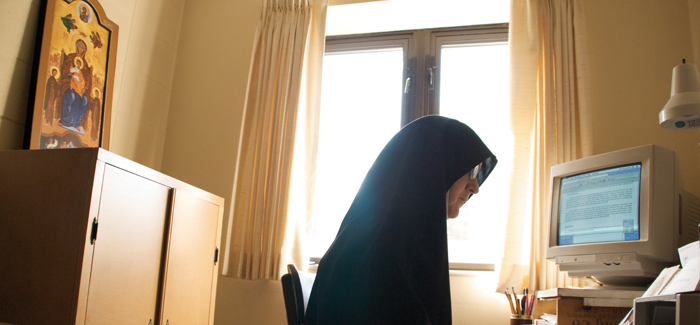
(Photography by Abbie Reese, MFA’13)
Abbie Reese, MFA’13, talks about her time in the cloister.
When I read “Ordered Lives” in the May–June/14 issue of the Magazine, a piece where independent scholar Abbie Reese, MFA’13, reflects upon her time taking oral histories from cloistered nuns, I finished wanting to know more. So I reached out to Reese with some follow-up questions.
[[{"type":"media","view_mode":"media_original","fid":"1777","attributes":{"alt":"","class":"media-image","height":"338","typeof":"foaf:Image","width":"460"}}]]
Did you dress a certain way when you went to the cloister?
Typically, when I conducted interviews, my routine was to take off my dangly earrings and any rings, and leave the jewelry in my car. I didn’t wear much, if any, makeup. I usually wore black, especially on those days when I went inside the enclosure to make photographs. I always hoped the dogs would ignore me, but my presence always stirred them up.
During an interview near the start of this project, one of the nuns told me that I should be mindful of what I wore when I entered the enclosure. I was a bit taken aback; that may have been the most direct instruction from any nun to behave a certain way.
The novice mistress, who helps young women acclimate to the monastery, explained this: Since the Poor Clare Colettine nuns wear a traditional full habit, they aren’t used to seeing anything more than wrists and fingers and the face. Sister Mary Nicolette helped educate me; I dressed more modestly. I had told the mother abbess from the start that I wanted to go inside the enclosure to make photographs. I made the changes, and I was invited inside the enclosure. I’m sure it was a sign to the mother abbess and the community that I respected their values while in their space.
[[{"type":"media","view_mode":"media_original","fid":"1778","attributes":{"alt":"","class":"media-image","height":"338","typeof":"foaf:Image","width":"460"}}]]
What did you observe when the nuns work the prayer hotline? What did it seem like most callers needed help with?
At the beginning, that was a primary question: What do the nuns say to the callers? What do people ask? I wanted to hear. I got permission from the mother abbess to listen in and record the calls—the nuns’ side of the conversation. I can’t remember exactly what transpired, but I decided not to do that; it seemed intrusive.
I looked at the daily list of prayer requests that the nuns copied down by hand, which they transcribed by typewriter, and then shared with the community aloud and posted outside the mother abbess’s office. The callers ask for prayers for physical healing (from tumors, cancers, heart conditions, difficulty getting pregnant), marital troubles, financial difficulties, and on and on.
I asked the nuns assigned to answer these calls about their experiences; this shed light on their perspective and struggles. Poor Clare Colettine nuns remove themselves from the world to draw closer to God and essentially to serve as emissaries and to mediate on behalf of humanity. They believe their prayers and penances can change the course of history.
Because they observe monastic silence, they don’t typically chitchat or make small talk, and because they seek anonymity, the nuns aren’t supposed to tell the callers their religious names—they’re supposed to say that they’re just one of the sisters. (They don’t want the callers to get attached and call back asking for one nun.)
Sister Mary Clara shares her name, though, and she gets attached to the callers. If she doesn’t hear from someone in a while, she asks permission to write a letter to inquire about her health and situation.
[[{"type":"media","view_mode":"media_original","fid":"1779","attributes":{"alt":"","class":"media-image","height":"338","typeof":"foaf:Image","width":"460"}}]]
In the book many of the nuns refer to God as their “spouse”: why this term and not “husband”?
The mother abbess says that the word husband denotes a human; they use the word spouse because it’s a divine relationship, not a human relationship, on the spiritual realm.
Read the rest of the interview at Zulkey.com.
